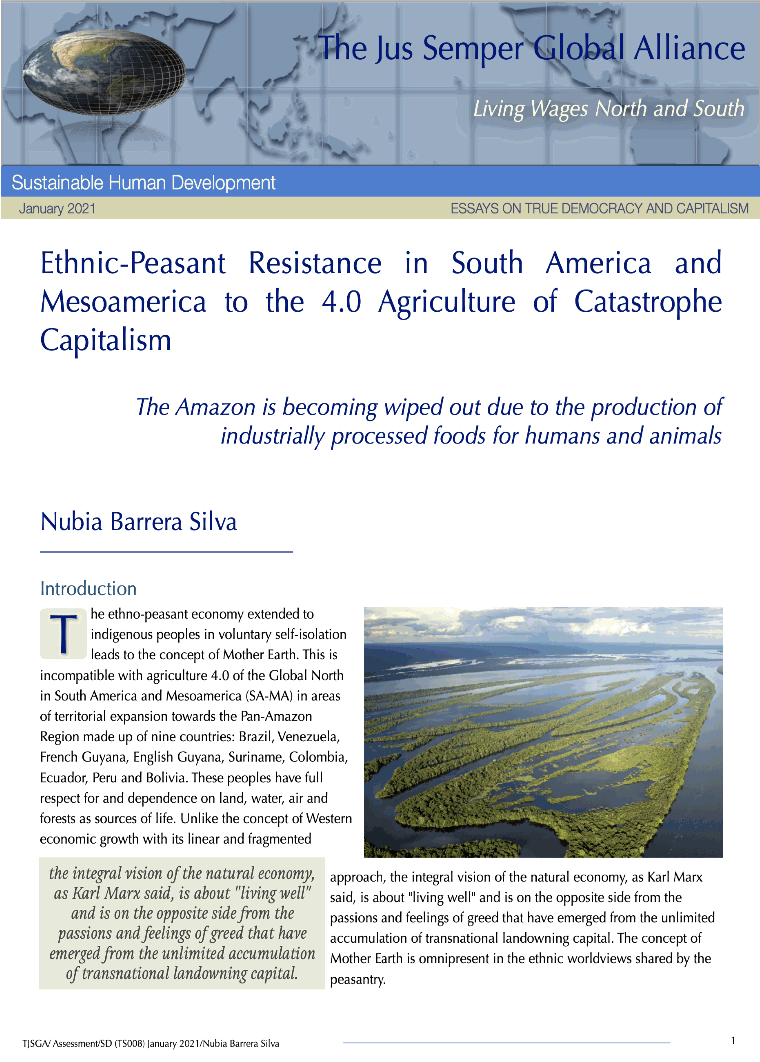Ethnic-Peasant Resistance in South America and
Mesoamerica to the 4.0 Agriculture of Catastrophe Capitalism
The Amazon is becoming wiped out due to the production of industrially processed foods for humans and animals
Nubia Barrera Silva
The ethno-peasant economy extended to indigenous peoples in voluntary self-isolation leads to the concept of Mother Earth. This is incompatible with agriculture 4.0 of the Global North in South America and Mesoamerica (SA-MA) in areas of territorial expansion towards the Pan-Amazon Region made up of nine countries: Brazil, Venezuela, French Guyana, English Guyana, Suriname, Colombia, Ecuador, Peru and Bolivia. These peoples have full respect for and dependence on land, water, air and forests as sources of life. Unlike the concept of Western economic growth with its linear and fragmented approach, the integral vision of the natural economy, as Karl Marx said, is about "living well" and is on the opposite side from the passions and feelings of greed that have emerged from the unlimited accumulation of transnational landowning capital. The concept of Mother Earth is omnipresent in the ethnic worldviews shared by the peasantry
The worldview of simple life belongs to the natural economy, it embodies a compelling reason from the ethnic-peasant mentality, which sustains and strengthens peasant struggles without time of rest in defence of their territories inherited from their parents. This conception from the tribal community engenders fear and respect for nature. The property of the small ethnic-peasant farmer offers him a roof of his own with a wide horizon towards infinite nature and the land to sow, harvest, exchange seeds between neighbours, sell the surpluses in the local market for the benefit of other social, cultural and subjective satisfiers that give meaning to the existence and to the communities where they live. Indeed, the “work of food sovereignty as a political dimension is essential in agroecology, as is the Agrarian Reform. When landless, we have to fight for Agrarian Reform, and without agroecology, we cannot conceive of healthy food production for the people”.
The concrete actions of struggle and resistance of the International Movement Via Campesina, its leaders and women leaders gain the strength from the same land that they defend with their own lives. Differential income, food sovereignty, the protection and conservation of biodiversity and natural resources are built around the peasant economy, key to climate resilience. It carries in its essence the foundations of ecological socialism. The spiral of change does not wait. The SA-MA Region is in an explosive situation. The new generations are taking to the streets in defence of inclusive public budgets, the end of corruption of professional politicians, the provision of social services, the end of police repression and so on. Faced with the imminent collapse, turbulent winds are coming with an opening to another economic system different from capitalism. The most in line with food agroecology is ecological socialism.
For a full read of this brief, click here or on the picture to download the pdf file. |






